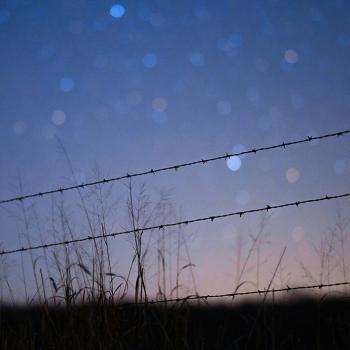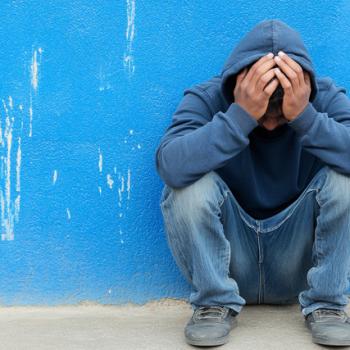A friend of mine died unexpectedly last week. We weren't close friends, but we often sat together in the men's meeting at church and talked about grandchildren and such. He often tried to talk with me about BYU sports, until he finally learned that's a subject about which I know nothing. So we stuck to things I was capable of talking about.
My friend was a good man. He did what he was asked to do in our congregation, and he did it well, finding joy in the service he was called to. But he was also someone who had lived a difficult life.
He knew well that many, perhaps most, of his difficulties were of his own making. Multiple marriages, many children, blended families, difficult personal sins, serious offenses against others—these were among the things he had wrought with his life.
To say the least, he had not always been a good person, though like all of us there had always been many good things about him. Some might say that he'd been a hypocrite, and I doubt that he would have disagreed. He did shameful things and hid them from others, not wanting his shame to be exposed. Those shameful things wreaked havoc in his family. In spite of that, by the grace of God he ultimately overcame what caused that shame and came to live a good life.
The journey to his new life was not easy. It meant public humiliation. It meant acknowledging his crimes. It meant asking for forgiveness and making what little restitution it was possible to make. It meant recognizing that his sins exceeded his ability to pay for them. It meant depending on the mercy of Christ. He did those things and had lived a new life for several years.
We celebrated my friend's new, good life at the funeral, remembering him for the good parts of the person he'd been even when he wasn't a good person, but mostly rejoicing in the good person that he had become. Unfortunately many members of his family did not come to our celebration.
For them, the good man he had become was not yet believable. They still suffer. Perhaps they bring some of that suffering on themselves, piling suffering on top of the suffering that he created in the tortured shape that sin takes. Perhaps his sins against them were so gross as to make it as yet impossible for them to overcome their pain. I don't know; I can't know. It isn't for me to judge. But I know that my friend's family is a family filled with pain and sorrow, love and joy.
Thinking about my friend's life, it seems emblematic of human life in general. We are in a world filled with love and joy but also filled with sin and sorrow. We hurt each other, sometimes only slightly, sometimes horribly. Some of the wounds we cause are paper cuts, sharp and quick but not serious. Other wounds are deep and deadly, though perhaps not even felt at first. Sometimes our sins against one another are conscious, but often we hurt each other without even knowing that we do. And we are among the worst at judging which kind of wound we have inflicted.
Perhaps ultimate reconciliation is impossible. Perhaps we are doomed to this mixture of love of and separation from one another. If so, perhaps we ought simply to be reconciled to that mixture of pain and joy with a Nietzschean cry, "This is what it means to be alive! Love it."
Christianity says that is not enough. For one thing, like most religions it obliges us to ameliorate the physical, mental, and spiritual suffering in the world, even knowing that we cannot bring that suffering to an end. Christianity also promises us that a more thorough reconciliation is possible: Christ died to reconcile us with the Father and with one another in an ultimate reconciliation. We await the glory of the heavenly reconciliation.
But the reconciliation that Jesus offers is not as distant from reconciling ourselves to the mixture of pain and joy in the world as we may at first think. Nailed to a cross, in the midst of his execution, he said "Father, forgive them; for they know not what they do" (Lk. 23:34). He reconciled himself to his executioners though they had not repented of what they had done, though he had received no recompense for his suffering at their hands. He found the joy of reconciliation while yet in pain.
Jesus' reconciliation to his enemies did not require either their repentance or his heavenly reward. It happened in the midst of his suffering. That infinite, divine reconciliation ought to be our model of the reconciliation for which we aim both now and in the future. If we have taken Jesus' name on ourselves, we owe it to him and to our Christian covenant to identify ourselves with him to learn to be reconciled as he was, not after the fact of suffering but in it.
That does not mean allowing criminals to go free, refusing to hold them accountable for their crimes. It means, though, not allowing the need for justice to overcome the demand for reconciliation. Justice is an appropriate part of reconciliation, but we cannot refuse reconciliation because we are not yet satisfied that justice has been done. If vengeance is the Lord's and not ours (Dt. 32:5), then our demand for justice cannot be confused with a demand for vengeance. And when it is not, then it is compatible with reconciliation.
The Christian message is that reconciliation is possible, both now and, ultimately, in the presence of God. Jesus taught us that reconciliation does not mean the end of all pain, but the reconciliation of our pain with our love for others. That is certainly true in this life. Perhaps it is also true in the next. The promise is that families as narrow as a couple or as wide as the human race can be reconciled in their pain.
12/2/2022 9:09:21 PM





